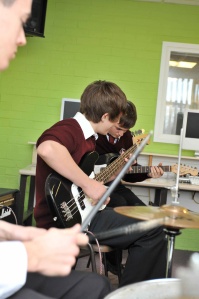Seven tips for advocating what music means to your school
If you’re a music teacher, trying to keep up with all the changes in education is one thing. Making sure what’s going on in your music lessons and activities is noticed and valued is probably one of those ‘to dos’ at the bottom of an ever-increasing list. There are lots of rumblings about the need to advocate music education more widely. Whether it’s to address the threats facing music education or to ensure that you exploit the opportunities (whichever way you look at it) getting better at advocacy and communications will help.
Who will take the lead on this nationally, and when it will happen, no-one seems to know. But that doesn’t really matter, because good communications campaigns start from the grassroots. They start with people having conversations and telling their stories, and taking every opportunity to make that connection.
In a previous editorial on the Teaching Music website, secondary music teacher Toby Fox pleaded for bite-sized ‘Big Mac music pedagogy’: simple, clear information, focused on solutions, for the over-pressed teacher. So I’m not going to continue with lengthy prose but will just throw out a few suggestions for some of the ways people can start the advocacy ball rolling:
1. Identify advocates/champions who are in positions of power: find out which people on your board and senior management team are most likely to be supportive – and start building a relationship. Invite them to visit, take them for a beer, talk to them, start by making that connection, and then keep it going.
2. Get students involved in promoting what you do (and eventually parents): They’re the champions that can really win hearts and minds. Talk to them about why it’s important they’re vocal about what they’re doing: why they think music is important and how it’s affected them. Get their ideas on how to raise the profile of what they’re doing. If you’re in a secondary, team up with English or Media departments to make a project out of your music ed campaign. Use photos, videos and quotes that you can put on YouTube, Flickr and Facebook (Facebook ‘official’ pages are free and don’t mean that visitors can access your personal pages. Find out more here).
4. Work out your own simple, concise messages: these should be about what you’re achieving, and what the benefits are to pupils, and to the school as a whole. Be crystal clear about these and reinforce them at every opportunity using stories, anecdotes and statistics. If there are ways in which people can support you (donate money, time, have a conversation with someone in a position of power, or sign up to an email list) then make sure to include those calls to action.
4. Give your champions the material they need to advocate music education: They need short, memorable, facts and stories/anecdotes (see next point) about why music education is important, why it may be under threat, and what might happen if it isn’t supported. Find a way of communicating this information that works for them (eg termly one-page summary, occasional lunch meeting, pre-performance presentation, information on the back of every letter home).
5. Reinforce your own stories with evidence from other places: there’s a stack of evidence about the value of music to young people’s personal development and academic achievements. It’s not always easy to find, but a starting point is Susan Hallam’s The Power of Music report. It’s tricky to find, so I’ve uploaded full and summary versions on this blog here. Also see the links at the bottom of this page.
6. List the benefits of music education and any messages/anecdotes from your own experience wherever you can: on your website, on concert programmes, and other publicity materials. See this simple list of benefits developed for one music service’s website.
7. Write a press release and email it, along with photos, to your local paper. It just takes one phone call to make that contact, and they could give you massive support – better still, get your students to do it. This could be about pupil successes, a story about a particular pupil, the school concert. Do it again and again, any time you have any news. Papers love good news stories – and particularly photos – about young people. It’s important to keep this going, to reinforce your messages in people’s minds.
More help and resources
Music education in the United States has been under threat for years and various organisations have developed some great resources for advocating music education. Below are links to just some of them (if you know of any UK-based sites I’ve missed, please let me know: anita@writing-services.co.uk):
http://www.menc.org/resources/view/booster-advocates
http://childrensmusicworkshop.com/advocacy/index.html
www.musicempowersfoundation.org/why-music.html
www.menc.org/supportmusic_cases
www.musiccountusin.org.au/musicbenefits (an example from Australia)
For parents specifically: www.amparents.org
And finally, an example of what one inspirational music group has done to promote their school group in the US: www.stepandclose.com/
This blog was first published as a lead editorial on the Teaching Music website on 5 December 2011.
NAME (the National Association of Music Educators), the FMS (Federation of Music Services) and ISM (Incorporated Society of Musicians) are collaborating on a campaign to raise the profile of music in schools. Full details are yet to be released, for more information, see the NAME Chair’s blog


Well stated. Here are a few resources to assist with item number 1.
“From the Band Room to the Boardroom”
http://bizmusician.wordpress.com/2010/04/06/435/
[…] Seven tips for advocating music in your school […]